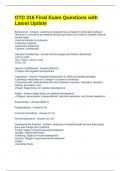OTD 316 Final Exam Questions with
Latest Update
Behaviorism - Answer--Learning is measured as a change in observable behavior
-Behavior is caused by an external stimulus and there is no need to consider internal
mental states
-External stimulus to response
-Learning is passive
-Classical conditioning
-Operant Conditioning
Classical Conditioning - Answer-(Pavlov {dogs} and Watson {Humans})
-UCS to UCR
-CS + UCS = UCS to UCS
-CS to CR
Operant Conditioning - Answer-(Skinner)
-Positive and negative reinforcement
Cognitivism - Answer--Replaced behaviorism in 1960s as leading paradigm
-Learning is measured as a change in a learner's schemata
-Concerned with understanding the mind (attention, memory, motivation, decision-
making, perception, etc.)
-Piaget: Stage theory of cognitive development
Piaget - Answer-Stage theory of cognitive development
-4 Stages: sensorimotor, preoperational, concrete operations, and formal operations
Sensorimotor - Answer-(Birth-2)
Preoperational - Answer-(2-4)
Concrete Operations - Answer-(7-11)
Formal Operations - Answer-(11-15)
Developmental Theories - Answer--Learning is viewed through the lens that people
grow and change over a lifetime
-Freud: Stages of psychosexual development
-Bowlby: Attachment theory
-Kohlberg: Stages of moral developemnt
-Erikson: Stages of psychosocial development
-Piaget
-Parenting Styles
,Freud - Answer-Stages of Psychosexual Development
-Oral, anal, phallic, etc.
Bowlby - Answer-Attachment Theory
Kohlberg - Answer-Stages of Moral Development
Erikson - Answer-Stages of psychosocial development
-8 Stages of identity and psychosocial development one passes through over a lifetime
(infant = trust vs. mistrust; young adult = intimacy vs. isolation; middle aged adult =
generativity vs. stagnation; late adult = integrity vs. despair)
Infant - Answer-Trust vs. Mistrust
Young Adult - Answer-Intimacy vs. Isolation
Middle Aged Adult - Answer-Generativity vs. Stagnation
Late Adult - Answer-Integrity vs. Despair
Humanist Theories - Answer--Learning is a personal attempt to fulfill one's potential;
learning is student-centered and personal; teacher is a facilitator
-Abraham Maslow's Hierarchy of Needs
-Carl Rogers
Abraham Maslow - Answer-Hierarchy of Needs
-Physiological, safety, love/belonging, esteem, and self acualization
Carl Rogers - Answer-Client-Centered Therapy
Social Learning Theory - Answer--Bandura
-People learn from each other (observation, imitation, modeling)
Constructivism - Answer--Vygotsky, Dewey, etc.
-Human are active in constructing thier own knowledge by linking new information to
prior knowledge
-Includes discovery learning (bruner), problem based learning, social development
theroy (Vygotsky), Experiential learning (kolb)
Motor Learning - Answer--A set of processes associated with practice leading to
relatively permanent changes in the capability for responding
"practice makes permanent"
-Learning happens in the brain, Our job as teachers/therapists is to affect
synaptogenesis
---Long term potentiation or depression at synapses
,-Because learning happens in the brain, it isn't always directly observable
-We infer learning has occured based on behaviors we can observe
Problems with Motor Learning - Answer--"Plateaus" may actually be periods of time
where much is going on in the brain, but little can be observed
-Just because patient shows a performance change doesnt mean they have learned a
new skill
Performance - Answer--Within session observations
-Short term capabilities as a result of instruction
-Temporary changes in response during practice
Learning - Answer--Persist from session to session, month to month, year to year
-Long term potentiation or depression
-Relatively permanent changes in the capability for responding
How is motor learning measured? - Answer--Retention tests
-Generalizability
-Reduction in errors
-Increased automaticity
-Decreased effort
-Increased speed
-Demonstration of skill after no practice
Stages of Motor Learning - Answer--Cognitive (acquisition)
-Associative (retention)
-Autonomous (generalization)
Cognitive (Acquisition) - Answer--Task is new
-Conscious attention needed
-Feedback is very important
-Performance inconsistent
-Improvements are rapid
Associative (Retention) - Answer--Longer stage (weeks to months)
-Feedback is monitored internally
-Performance becomes consistent
Autonomous (generalization) - Answer--Automatic
-Feedback is minimally important
-Improvements are slow but can continue for years
Feedback - Answer-Intrinsic (inherent)
Extrinsic (augmented)
-All the sensory information available as a result of movement that a person has
produced; aka response-produced feedback or movement-produced feedback
, Intrinsic (inherent) - Answer-Generated by an individual's sensory system and results
from movement itself
Extrinsic (augmented) - Answer-Comes from an outside source (e.g., therapist, monitor,
effects of movement on environment, etc.); can occur concurrently or at the end of task
(terminal feedback); more effective in early stages of learning
Knowledge of Results (KR) - Answer-Terminal feedback related to outcome/goal
Knowledge of Performance (KP) - Answer-Feedback related to movement pattern used
to achieve goal
Practice Conditions - Answer-The most important factor in retaining motor skills is the
amount of practice
-massed practice
-distributed practice
-constant practice
-variable practice
-blocked practice
-random practice
-whole training
-part training
-guidance
-discovery learning
-simple tasks
-complex tasks
-transfer
-mental practice
-dyad training
Massed Practice - Answer-Amount of practice time is greater than the amount of rest
time
Distributed Practice - Answer-amount of rest time is = to or > amount of practice time
Constant Practice - Answer-Practicing same task with minimal variations
Variable Practice - Answer-Practicing same task, but with variations in context, size,
shape, timing, initial conditions, etc.
Blocked Practice - Answer-Practicing one task at a time (e.g., AAA, BBB, CCC, DDD)
Random Practice - Answer-Practicing x number of tasks in random order (e.g., ACDB,
BDAC, DCSA)




